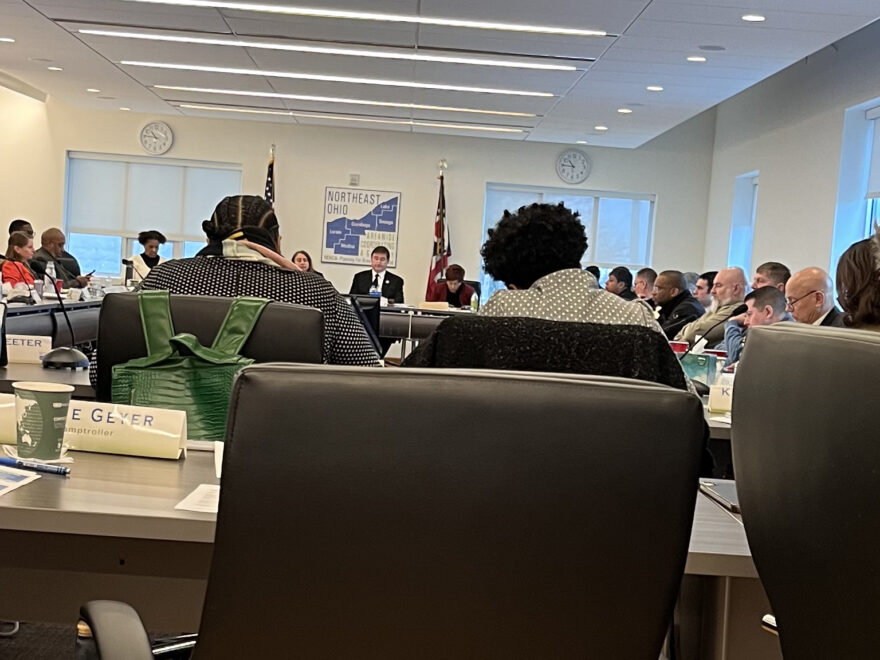 The Northeast Ohio Area Coordinating Agency’s (NOACA) restrictive public comment policy may be reviewed next week by the agency’s External Affairs Committee.
The Northeast Ohio Area Coordinating Agency’s (NOACA) restrictive public comment policy may be reviewed next week by the agency’s External Affairs Committee.
At a special meeting of NOACA’s Executive Committee this morning, Lake County Commissioner John Plecnik said the agency should explore options to make the public comment period at board meetings more accessible to people who want to speak. Cuyahoga County Councilman Dale Miller agreed that the public should be given ample time to comment.
On the other hand, University Heights Mayor Dylan Brennan and Adam Friedrick, retired Medina County commissioner, pushed back on giving the public more opportunity to address the NOACA board during meetings. Plecnik, Miller, Brennen and Friedrick are NOACA directors.
A public comment period during NOACA board meetings is limited to 30 minutes, and each commenter is allowed three minutes to speak. People who plan to speak must sign in before the meeting begins and specify what agenda item they want to speak about.
Around 50 people attended the board’s January 20 meeting, many of whom planned to comment about NOACA’s regional Climate Action Plan, which is in development. A small portion of them were allowed into the meeting, while the majority were allowed to watch a live stream of the meeting in a conference room. The group was told that space in the meeting room was limited by fire laws.
The attendees also were told that they could not comment about the climate plan because it had been removed from the agenda. Skip Claypool, former NOACA board member and former Geauga County commissioner, nonetheless, did speak in opposition to the climate plan, causing John Hamercheck, NOACA board president and Lake County commissioner, to become unhinged.
Following the meeting, on February 2, Hamercheck, provided his version of the meeting in a memo to the board, in which he reported that “several board members and staff observed and heard hate speech and gestures from some of the individuals in attendance,” and, for some reason, filed an incident report with the Anti Defamation League, an organization that fights against antisemitism. Hamercheck also said NOACA “increased the presence of security personal and actuated metal detectors” in response to the crowd that showed up.
“NOACA is concerned for the safety and security of persons in attendance at our meetings and will not tolerate such behavior,” Hamercheck wrote.
In reality, there was no threatening behavior or “hate speech” before, during or after the meeting.
At its next board meeting, on March 10, NOACA was prepared for the expected crowd. Although some members of the public were allowed into the meeting room, the “overflow” rooms that were offered during the January meeting were not opened. Those who were not admitted into the meeting room were told that they had to wait outside the building.
Ten people were permitted to make comments. Eight of those spoke in favor of the Climate Action Plan. Most of them protested a language change to the proposed plan in which references to “climate” were replaced with “emissions reduction.” The language change took even board members by surprise during the meeting. How and why the language was changed remained a mystery even at today’s special Executive Committee meeting. During the March 10 meeting, two members of the public spoke in opposition of NOACA’s climate plan, one of which was approached by a sheriff’s deputy and told his time was up even though he had spoken for only two of his allotted three minutes.
During this morning’s special meeting, Plecnik addressed the agency’s public comment policy.
“We should explore ways to make the public portion more accessible,” he said, noting that other public bodies don’t require speakers to sign in in advance. He also suggested that NOACA consider having two public comment periods—near the beginning and the end of the meetings—noting that the business conducted during the meeting often inspires audience members to comment or ask a question.
“I want to pile on and support the commissioner’s comments,” Miller said. “At the last meeting it was cut off at 10 speakers. Everybody who wants to speak should be able to speak. If we have to sit and listen to everybody, that’s the way it works.”
John Gall, sitting in for Lorain County Commissioner Jeff Riddell, agreed and said the board should consider whether the current 30-minute limit on public comment gives the public sufficient time to speak.
Brennen and Friedrick, however, were opposed to making public comment more accessible.
“We did hear from both sides [at the March meeting],” Brennen said. “We don’t need to change anything.”
Friedrick said he doesn’t want to hear more comments from the public because it would take too long—a lesson he learned, he said, when he was a Medina County commissioner.
NOACA’s External Affairs Committee is expected to address the public comment policy at its meeting on April 14, at 8:30 a.m., at 1261 Superior Ave, in Cleveland.
Meanwhile, the Climate Action Plan, which was originally scheduled to be released in June, will not be finalized until December, according to Danielle Render, NOACA’s director of public affairs.
While the plan would cover the agency’s five county region—Cuyahoga, Lake, Geauga, Lorain and Medina—NOACA doesn’t have enforcement power to implement the plan. The plan would contain recommendations for local jurisdictions to consider, Render said.
“We are not in the business to enforce but to inform and prepare the region for the future of carbon reduction,” she said in an email. “As a transportation and environmental planning organizations we do research and provide recommendations for action and as a planning guide. The board of directors will review to adopt the [climate] plan in December 2023.”
Render’s definition of NOACA as a “transportation and environmental planning organization” is incorrect. The agency is, in fact, a “Metropolitan Planning Organization (MPO)” created by the federal government to carry out metropolitan transportation planning—not environmental planning.

